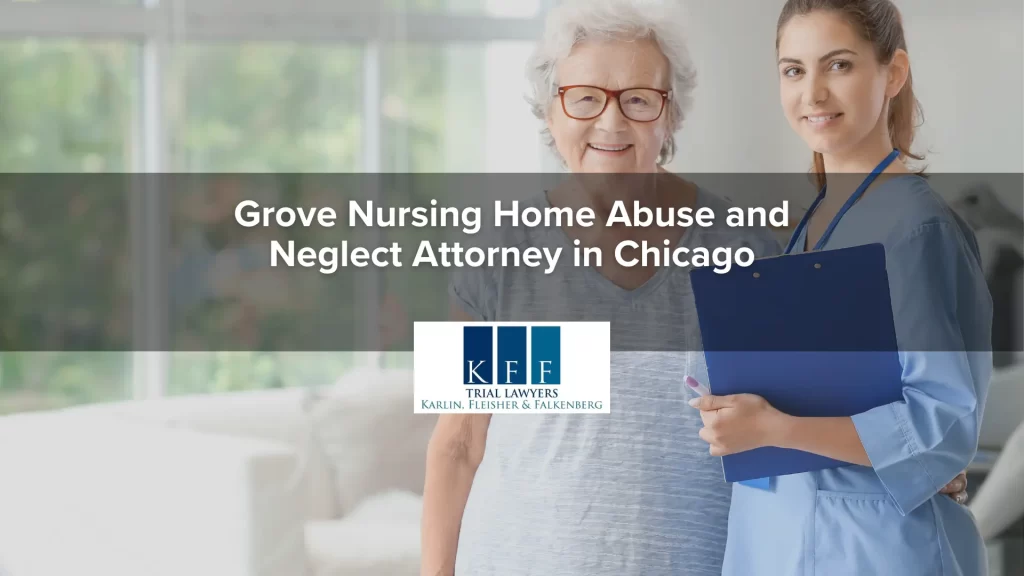
Most nursing homes are for-profit entities with a vested financial interest in building out extravagant websites that house pictures of smiling residents and loving caregivers doting on them. They use words like “home-like,” “sophisticated,” or “luxurious” to draw people in and make them feel like they are getting the best care possible in a serene and peaceful setting. The Grove Nursing Home family of skilled nursing home facilities puts their best foot forward, hoping to draw in residents. Can family members be certain that the care provided at the Grove and other nursing home facilities is just as it is described in the brochure?
We all know that the sales pitch tends to be more glamorous than reality, but in the case of nursing homes, what lurks underneath can be dangerous and even deadly. The World Health Organization estimates that at least one in six elderly adults in a nursing home setting will experience some form of abuse.
If you suspect that a loved one may be suffering some form of abuse while living in a nursing home facility, contact the legal team at Karlin, Fleisher & Falkenberg, LLC for help. We will listen to your suspicions with kindness and compassion and conduct an investigation into your claims. Your loved one deserves the best care possible, and when their nursing home fails them, that facility should be held accountable.
Let the knowledgeable nursing home attorneys at Karlin, Fleisher & Falkenberg, LLC put their experience and skills to work for you. Call us now at 312-346-8620 to schedule a consultation.
What Is the Definition of Nursing Home Abuse?
Nursing home abuse is defined as any form of harm inflicted on an elderly resident by an individual of power or authority. Harm can be interpreted in several different ways. That’s because several different types of abuse may negatively impact a nursing home resident.
Physical harm is what first comes to mind when people think of the term “abuse.” However, there are other ways in which a nursing home resident can be harmed. Cases of nursing home abuse may fall into one or more of the following categories:
Potential Warning Signs of Abuse
One of the most valuable things you can do for a family member who resides in a nursing home is to learn to recognize the warning signs of abuse. Again, most people tend to think of abuse as solely a physical act. That isn’t always the case. Broken bones or unusual bruises may only be part of the story. The scars left behind by emotional abuse aren’t as easy to see, but they are just as detrimental to an elderly resident’s health as physical abuse.
Statistics indicate that elderly people who have suffered any form of abuse have a 300 percent greater risk of death compared to their un-abused counterparts. So how do you determine if abuse is taking place? Look for some of these common warning signs:
- Bedsores
- Broken bones
- Unexplained bruises, cuts, or marks
- Burns
- Concussions
- An unusual number of falls
- Blood on underwear
- Sudden difficulty sitting or standing
- Bruises on thighs
- Bed linens with blood on them
- Unchanged or unwashed bedding or clothing
- Malnourishment
- Dehydration
- Change in sleeping or eating patterns
- Uncooperative with certain staff members
- Anxiety
- Depression
- Withdraws from family, friends, or social interactions
- Poor hygiene
- Sudden change in a financial situation
- Missing possessions
While this list is extensive, these may not be the only warning signs for abuse. If there has been a sudden change in your family member’s appearance, attitude, financial situation, or medical condition, and you suspect it may be linked to abuse, share your concerns.
At Karlin, Fleisher & Falkenberg, LLC, we will always take the time to listen to your concerns. We understand that you might not be comfortable with confronting this type of situation alone. Let a legal team with experience investigate your suspicions and get to the heart of what’s bothering you.
What If a Family Member Is Being Neglected?
 Just because a family member isn’t being hit or berated doesn’t mean they aren’t suffering. The National Center on Elder Abuse categorizes neglect as a form of abuse, as well. They find that nearly 95 percent of nursing home residents have suffered neglect or witnessed another resident being neglected in some fashion.
Just because a family member isn’t being hit or berated doesn’t mean they aren’t suffering. The National Center on Elder Abuse categorizes neglect as a form of abuse, as well. They find that nearly 95 percent of nursing home residents have suffered neglect or witnessed another resident being neglected in some fashion.
Neglect is more serious than a caregiver making a mistake or forgetting one part of a daily routine one day. Neglect is a pattern of serious behavior that deprives an elderly resident of some basic form of care. A caregiver may be guilty of one or multiple forms of neglect, depending on which needs and necessities they choose to withhold from a resident. Forms of neglect can include:
- Medical neglect
- Basic needs neglect
- Hygiene neglect
- Social neglect
Remember, elderly family members rely on these caregivers for their medical care and basic everyday needs. They may be afraid of coming forward with their claims or talking to family members about what is happening for fear that their treatment may get worse. Abusive caregivers can lash out and retaliate against the elderly if they suspect a resident has made comments about them or filed an official complaint.
Nursing homes slow to investigate may leave these abusive caregivers in place, making the resident’s situation worse. It may be up to you to seek help for a family member who is too afraid to talk about neglect or abuse.
Can Karlin, Fleisher & Falkenberg, LLC Investigate Claims of Abuse?
Unfortunately, claims of abuse and neglect in the Chicago nursing home community are not new. That’s why, at Karlin, Fleisher & Falkenberg, LLC, we have assembled an experienced legal team and given them the resources they need to investigate and pursue claims of nursing home abuse. Predators and the employers who hire and keep them on staff must be held responsible for their actions and cannot be allowed to continue to operate under the status quo.
If you suspect a loved one is being mistreated at their nursing home facility, please contact Karlin, Fleisher & Falkenberg, LLC at 312-346-8620 today. Don’t shoulder this burden alone; let our experienced Chicago nursing home abuse attorneys investigate your suspicions.
